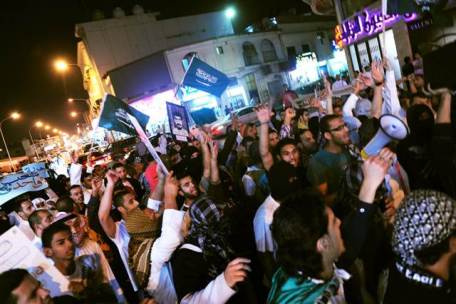Between Hammer and Anvil

It would be hard confession for the Saudi government, but the wave of protests in the Arab World is slowly rocking the Persian Gulf Big Brother. The demonstrations have been limited to Shi’a-dominated cities in east of the country so far, but as the cracks are running up the establishment, the unrest may spread to Sunni provinces. IRD probes the situation in an interview with Masoud Assadollahi, Middle East affairs expert:
IRD: The Saudi government has blamed foreign countries for the recent unrest. How credible do you see the allegation?
MA: The recent protests sparked of when the Saudi intelligence service arrested the father of a Shi’a activist in order to force him to surrender. In the al-Awamiyah city of the Qatif governorate, where the incident took place, citizens came into the streets to show their anger with what they deemed as an act of abduction. The protests turned violent when police used excessive force to crack down on the protestors.
The Saudi regime’s representation of the event is skewed at best, claiming that the protestors attacked the government forces with Molotov cocktails. It also tried to place the blame on foreign countries, which is an unsophisticated reference to the Islamic Republic of Iran.
The political discrimination against the Shi’a minority is not something the Saudi regime could mask. Shi’as are hostile towards the central government due to the ceaseless injustice they endure. The protests were spontaneous and had a clear motive. The government’s struggle to portray the unrest as a foreign plot goes in useless, and the Arab Spring dispels such theorizations.
IRD: The international community eyes the developments in Saudi Arabia with worry. Would they back the Saudi Regime’s measures in order to maintain the status quo?
MA: Riyadh’s role as the guardian of stability and energy routes serves the interest of US and other Western countries, plus Israel. So these countries will eventually turn a blind eye on suppression of the protestors for the sake of their crucial interests. Any undesirable development in Saudi Arabia translates itself into an exponential upheaval in the global energy market and the global economy. Importantly, the Shi’a community is concentrated in Saudi Arabia’s oil-rich eastern region. There would be less sensitivity about the unrest if happened in a less strategic area.
IRD: Two weeks ago, we witnessed King Abdullah setting forward minor reforms which aroused the ire of Wahhabi muftis. Regarding the unique political structure of Saudi Arabia, how feasible do you see such reforms? Could they push the regime towards collapse?
MA: The recent reforms which granted suffrage to the women are cosmetic. Women’s situation in Saudi Arabia has always raised criticism and tarnished the country’s glossy image of absolute welfare and huge popular support for the regime. However, the backwardness of rules and regulations in this country has never turned into a serious concern for Riyadh’s Western allies.
The Wahhabi clerics’ rejection of the recently-introduced reforms has massive implications. Saudi Arabia’s political structure is based on two pillars: the royal family and the clerical institution. Any fissure between these two power centers will seriously undermine the status quo. The Saudi rulers are caught between hammer and anvil: on the one hand, they are pressed by popular demands, and on the other hand, they are wary about muftis frowning at the reforms.

